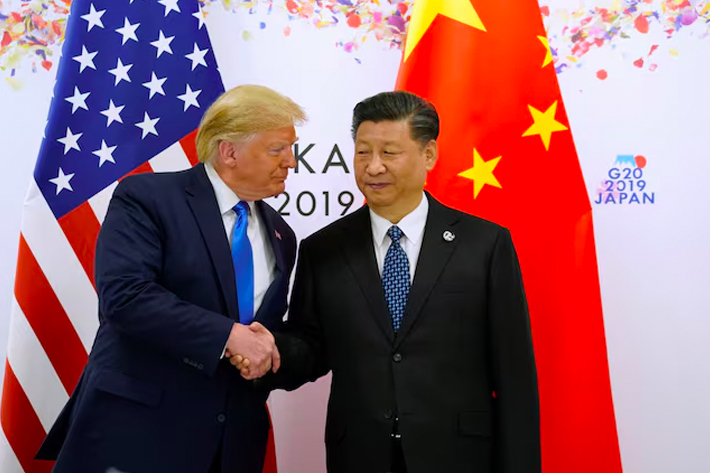US President-elect Donald Trump has reportedly invited Chinese President Xi Jinping to attend his inauguration in January, despite increasing tensions between the world’s two biggest economies.
Trump extended the invite to Xi in November, shortly after his decisive election victory, US broadcaster CBS News reported, citing multiple sources with knowledge of the matter.
US inauguration officials were working on plans to host more foreign dignitaries apart from Xi at the swearing-in ceremony set for January 20, CBS said.
Also on AF: Taiwanese Officials in US For Talks With Trump’s Team
The report noted that while envoys from other countries are usually invited to presidential inaugurations, no foreign head-of-state has attended the ceremony, according to records dating back to 1874.
CBS White House reporter Jennifer Jacobs noted that Trump’s invite to Xi, despite his recent hostility towards Beijing, may be rooted in a desire to establish negotiation power.
“Trump has long thought that leader to leader relationships… actually help him with deal-making,” Jacobs said.
“He’s always argued that he should be talking to these leaders, even the most difficult ones or the ones that have an adversarial relationship with the United States, including someone like Xi,” she said.
“He feels… the closer he can get to these leaders… the more he can get done, to advance his agenda.”
‘Xi unlikely to attend’
Even so, diplomatic precedent would suggest that Chinese president Xi is unlikely to attend the ceremony.
No Chinese head of state has attended a US inauguration so far, the South China Morning Post reported. Furthermore, Xi has never attended such events, and has, instead, sent an envoy to such events, it noted.
Just this year, Beijing sent envoys to attend inaugurations of Indonesian President Prabowo Subianto, Mexican President Claudia Sheinbaum and Panama President José Raúl Mulino, the SCMP noted.
Experts also told the SCMP that typically a state visit would involve months of planning, dialogue and preparations.
Xi would also be wary of the optics of a visit simply for an inaugurations, Josef Gregory Mahoney, a professor of politics and international relations at East China Normal University, told the SCMP.
“Does it reflect a kind of ‘royal prerogative’ on Trump’s part, to have other leaders attend and acknowledge his ‘crowning?’ China would be sensitive to such an appearance,” Mahoney said.
The Chinese embassy in Washington did not immediately respond to a request for comment.
Tiffs and talks
Trump’s invite comes at a tricky time for the US-China relationship, considering the president-elect has already declared he would impose a 10% tariff on all imports from China. That was after he vowed to impose tariffs as high as 60% on Chinese imports, during his campaign trail earlier this year.
Trump has named numerous China hawks to key posts in his incoming administration, including Senator Marco Rubio as Secretary of State.
Meanwhile, in an interview with NBC News last week, he said he “got along with very well” with Xi. Trump said he and Xi had been “communicating with each other”.
But on Tuesday this week, Xi made slightly more hawkish remarks as he personally addressed the tariff threat, for the first time since Trump’s election win.
“Tariff wars, trade wars and sci-tech wars go against the trend of history and the laws of economics, and there will be no winners,” Xi said, in a speech to heads of 10 major international economic organisations in Beijing.
He said he hoped the US will work with China to push bilateral relations toward a steady, healthy and sustainable direction, according to state-backed Xinhua.
‘Happy talk not enough’
Chinese officials, meanwhile, have made multiple statements this week saying they were ready to engage with the US.
On Thursday, the Commerce Ministry said China was open to engaging and communicating with the economic and trade team of the Trump administration.
That was after on Wednesday, China’s US Ambassador Xie Feng read a letter from Xi to a US-China Business Council gala in Washington, in which the Chinese leader said Beijing was prepared to stay in communication with the US.
“We should choose dialogue over confrontation and win-win cooperation over zero-sum games,” Xi said in the letter.
Xie added that the two countries should not decouple supply chains. But Nicholas Burns, the US Ambassador to Beijing, said in a pre-recorded video address that China at times tried to “sugar coat” challenging and competitive relations.
“No amount of happy talk can obscure our profound differences,” Burns said.
- Vishakha Saxena, with Reuters
Also read:
China Seen Taking on More Debt to Counter Trump Tariffs
China Central Bank ‘to Allow a Weaker Yuan’ as Trade Risk
Nvidia ‘Facing $1bn Fine’ as China Opens Anti-Monopoly Probe
Chinese Media to Trump: ‘There Are No Winners in Tariff Wars’
Economists Say Trump Won’t Hit China With 60% Tariffs Early On
Retaliatory Trade Tariffs Could Backfire on Asia, IMF Warns
Trump’s Plan to Kill EV Tax Credits ‘Could Benefit China’
Trump Will Have Big Impacts on Trade, Climate Change, EVs
Trump Says He’ll Hit China With Big Tariffs if it Takes Taiwan
In U-Turn, Elon Musk Says US Tariffs on Chinese EVs ‘Not Good’
What Will Donald Trump Mean For Global Carbon Markets?
























